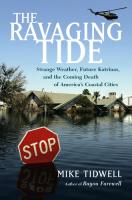What responsibility does an environmentalist and science defender have to criticize one of his or her political allies for inaccuracy and the incautious treatment of complex information?
Must we be equal opportunity critics in all cases, or should we blunt our barbs lest they injure our friends?
The question arose for me earlier this week as I prepared to participate in a University of Maryland-College Park panel discussing Maryland-based climate activist and writer Mike Tidwell‘s 2006 book The Ravaging Tide: Strange Weather, Future Katrinas, and the Coming Death of America’s Coastal Cities. The book has been assigned as the “first year book” for some 4,000 University of Maryland freshmen.
So the panelists–climate scientists Raghu Murtugudde and Dan Kirk-Davidoff of the University of Maryland, Dork Sahagian of Lehigh University, and myself–had the opportunity to comment on Tidwell’s work.
Most of us criticized it: Murtugudde suggested Tidwell’s book might be “alarmist,” and Sahagian even used the term “histrionic.” But I levied the most detailed objections–although, alas, to a crowd only a tiny fraction of the size of the gigantic freshman class that had been given Tidwell’s book in the first place.
That experience is what inspired me to write this lengthy, two-part post. First, I want to rehash my objections to Tidwell’s book for a broader audience. And then in my second post next week, I’ll discuss how I resolved the question that I opened with–what might be called the Tidwell dilemma–in favor of being a vocal critic, rather than remaining silent.
Tidwell’s is a post-Katrina book written in anticipation of future disasters. It argues that global warming will devastate us due to the double whammy combination of rising seas and stronger hurricanes. As one of the many, many folks who predicted Katrina before it happened (in his previous book Bayou Farewell), Tidwell also draws a broad analogy between the failure to prepare for that disaster and our failure to prepare for global warming.
I take no issue with Tidwell’s discussion of sea level rise. Whether the phenomenon will be catastrophic or not remains to be determined; it depends greatly upon how much warming we allow and the stability of the ice sheets. Without a doubt, though, sea level rise is a part of the future that every coastal city must grapple with.
But Tidwell’s sixth chapter on the hurricane-global warming relationship–“Killer Hurricanes: Exporting Katrina to the World”–made my jaw drop.
Following Katrina, many environmentalists seized upon hurricanes as a new public relations tool to dramatize global warming. And this was either defensible or indefensible depending entirely upon how cautiously or incautiously it was done. Hurricanes will most assuredly change as a result of global warming, and there’s an ever increasing volume of scientific work on this. But as with many issues at the intersection of climate and weather, the subject is also exceedingly complex and rife with uncertainty.
So while it’s more than fair to discuss the hurricane-global warming relationship, it’s also easy to go overboard in doing so. Alas, Tidwell falls heavily into that trap.
The Ravaging Tide was obviously prepared relatively quickly following Katrina–an event that clearly had a strong impact upon its author. It’s plain from his text that Tidwell, like many Americans, felt greatly pained by the destruction of New Orleans. I did as well. My mother lost her home–it’s now a vacant lot, one she cannot even sell.
That’s devastating, but when we write about complex science, we must put our emotions aside. Nuance is required, lest we succumb to alarmism rather than a balanced discussion of risks. Unfortunately, I believe that Tidwell fails this test. Indeed, he begins to do so almost immediately, as he launches into a litany of hurricane “records” supposedly broken during the 2005 Atlantic season. Yet severe problems with our hurricane data make any claims about “unprecedented” occurrences exceedingly difficult or even impossible to make. Consider the following Tidwell passage about 2005’s Hurricane Vince:
In October, Hurricane Vince formed west of Spain very near the Madeira Islands in the northeastern Atlantic. Very, very few hurricanes ever form so close to Europe. Then Vince actually struck the continent, coming ashore as a tropical storm in Spain, a country that had never experienced such an event going all the way back to its ancient explorers, who reported such violent storms only in the far-off New World.
Tidwell seems to be saying that since the time of Columbus et al, Spain has never been hit by a tropical storm. Yet our hurricane records in the Atlantic only go back to 1851, not 1492–and well into the twentieth century, those records remain incomplete. Does Tidwell seriously think a tropical storm in Spain in, say, 1700 would have been well recorded and identified for what it was–long before radar, satellites, storm flying aircraft, and the very Saffir-Simpson hurricane scale itself? The very idea is absurd–and something similar could be said of Tidwell’s claim that storms like 2004’s Cyclone Catarina, which struck Brazil in 2004, “never existed before.”
Even as Tidwell writes repeatedly of hurricane “records,” then, he seems unaware of how problematic that word really is. Indeed, his entire chapter is strewn with similar types of problems–such as the author’s claim that a June storm formation occurred “unusually early” even though June is perfectly within the traditional bounds of the Atlantic hurricane season.
But it’s not just at the level of minor details that Tidwell’s treatment fails. It’s also the big picture. The whole chapter is built around taking a pair of scientific papers on global hurricane intensification published amidst the dramatic 2005 hurricane season–by MIT‘s Kerry Emanuel and by Georgia Tech’s Peter Webster and colleagues–and treating them as a kind of revealed truth. “Revealed” is Tidwell’s word, incidentally, not mine. He uses it repeatedly in his hurricane chapter.
But science doesn’t work through a process of revelation. The papers Tidwell hangs it all on are more properly conceived of as the beginning of an ongoing argument. Indeed, they were debated and criticized immediately after being published. Later, new papers were published in response to them, leading to more debate–and even today, we still don’t know whether or not they’re “right” (whatever that means). Rather than reaching a definitive conclusion, the hurricane-global warming debate has instead shifted to focus closely on the Atlantic, where the hurricane data, warts and all, are the most reliable. Once we figure out what’s up in our own backyard, we can then revisit what’s going on everywhere else. So while there are ample reasons to worry about the hurricane-climate relationship, don’t expect definitive answers any time soon.
That’s where things stand, but you wouldn’t know it from Tidwell’s book. Indeed, the author seems to misunderstand what the Emanuel and Webster studies found in the first place. Repeatedly, he confuses changes in hurricane strength with changes in hurricane size, two meteorologically separate issues. Small and big hurricanes alike can be extremely intense.
In essence, then, Tidwell is wading into a very complicated scientific area without anything approaching the requisite caveats. That’s unfortunate, because potential changes to hurricanes under global warming are a serious concern–but one that must be approached with nuance. Yet nuance is the last thing you find in the following passage:
As these future stressors pile up, running nonstop on so many different levels, even one Katrina disaster might be impossible for the nation to absorb in 2015 or 2025. Never mind two or three Katrinas every summer. I can’t help but wonder what I will do in my own region. The Chesapeake Bay, warmed and greatly enlarged by sea-level rise, will be an enhanced landing strip for newly pumped-up Atlantic hurricanes. A storm like Wilma, with an unusually tight and compact eye wall, will be able to travel in the future to within a few miles of the Washington Beltway and my house, refueled all the way by the hot and wide open water of a bay no longer buffered by vast marshes and islands. Where will I go after fatigue sets in from the first rebuilding and then the second and the third?
I sincerely hope a hurricane never affects Mike Tidwell’s home. But I hardly think postulating three Wilma-like storms hitting it in his lifetime–recall, Wilma is the strongest known Atlantic hurricane, a rare record-breaker that occurred in the highly hurricane-friendly Western Caribbean, not off the Atlantic coast–helps us to think seriously about how our risks might be changing.
In my second post, then, I will explain why, as a strong critic of misuse of science to serve political ends, I felt the need to be vocal about this type of writing on hurricanes and global warming.
Subscribe to our newsletter
Stay up to date with DeSmog news and alerts






